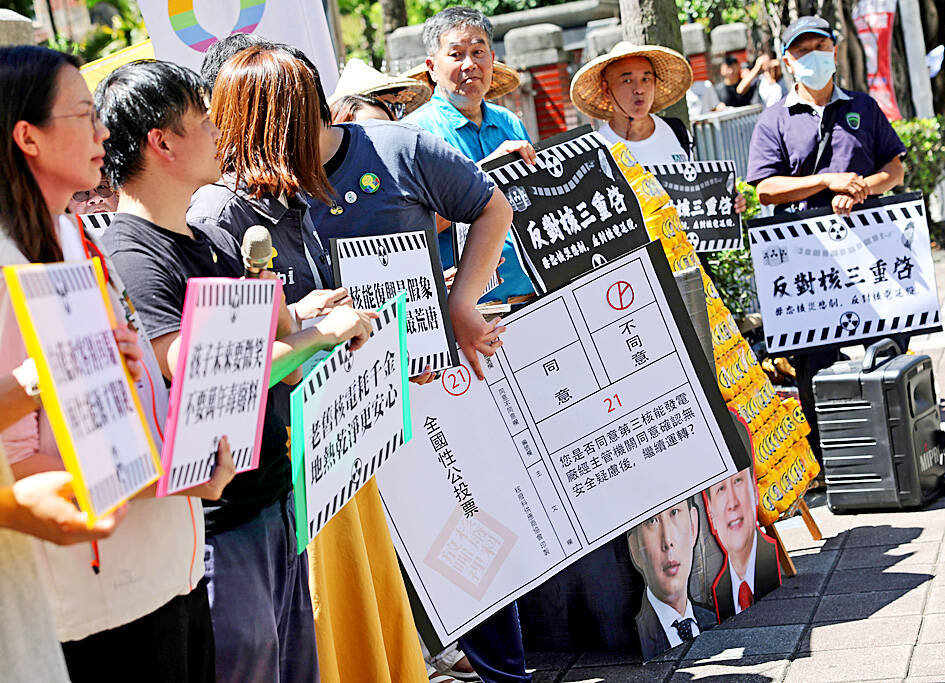Environmental activists and members of small political parties yesterday urged people to vote “no” in the national referendum on Aug. 23 about restarting the Ma-anshan Nuclear Power Plant.
Taiwan should invest more in geothermal power generation and other sources of sustainable energy to transition into low-carbon and safer electricity generation, Green Party Taiwan convener Kan Chung-wei (甘崇緯) said, and castigated the Chinese Nationalist Party (KMT) and the Taiwan People’s Party (TPP) for “raising false hope for reviving nuclear power in Taiwan.”
The Ma-anshan Nuclear Power Plant was decommissioned on May 17.

Photo: CNA
“Reviving the Ma-anshan Nuclear Power Plant would set the course back to the old, high-risk path and would be very expensive,” Kan said, referencing studies that showed that safety inspections, evaluations, equipment upgrades and the construction of earthquake-resistant engineering to enhance the stability of the plant would cost more than NT$100 billion (US$3.34 billion).
“The Ma-anshan plant has an old type of reactor, which cannot be renewed, and has high risk factors. Taiwan is densely populated, and if an accident occurs at the plant, it would be difficult to evacuate people and prevent the spread of radioactivity,” he said. “The result would be catastrophic.”
Even advanced nations have problems dealing with nuclear waste, Kan said.
It took Finland 40 years to complete an underground storage facility for spent nuclear materials, while Taiwan cannot even select a proper site, he said.
“It is highly irresponsible of the KMT and the TPP to choose to generate more nuclear waste,” Taiwan Obasang Political Equity Party representative Shen Pei-ling (沈佩玲) said. “Those would last many thousands of years, putting our future generations at risk.”
Taiwan Climate Action Network researcher Wei Yang (魏揚) said: “Restarting the Ma-anshan Nuclear Power Plant is the wrong choice. It would set back Taiwan’s renewable energy plan and weaken our international competitiveness in reducing carbon emissions.”
“A huge investment is also needed for new construction and the upgrade of old nuclear power plants, but that time and money would be better spent on the transition to renewable energy,” Wei said.

A preclearance service to facilitate entry for people traveling to select airports in Japan would be available from Thursday next week to Feb. 25 at Taiwan Taoyuan International Airport, Taoyuan International Airport Corp (TIAC) said on Tuesday. The service was first made available to Taiwanese travelers throughout the winter vacation of 2024 and during the Lunar New Year holiday. In addition to flights to the Japanese cities of Hakodate, Asahikawa, Akita, Sendai, Niigata, Okayama, Takamatsu, Kumamoto and Kagoshima, the service would be available to travelers to Kobe and Oita. The service can be accessed by passengers of 15 flight routes operated by

Alain Robert, known as the "French Spider-Man," praised Alex Honnold as exceptionally well-prepared after the US climber completed a free solo ascent of Taipei 101 yesterday. Robert said Honnold's ascent of the 508m-tall skyscraper in just more than one-and-a-half hours without using safety ropes or equipment was a remarkable achievement. "This is my life," he said in an interview conducted in French, adding that he liked the feeling of being "on the edge of danger." The 63-year-old Frenchman climbed Taipei 101 using ropes in December 2004, taking about four hours to reach the top. On a one-to-10 scale of difficulty, Robert said Taipei 101

Taiwanese and US defense groups are collaborating to introduce deployable, semi-autonomous manufacturing systems for drones and components in a boost to the nation’s supply chain resilience. Taiwan’s G-Tech Optroelectronics Corp subsidiary GTOC and the US’ Aerkomm Inc on Friday announced an agreement with fellow US-based Firestorm Lab to adopt the latter’s xCell, a technology featuring 3D printers fitted in 6.1m container units. The systems enable aerial platforms and parts to be produced in high volumes from dispersed nodes capable of rapid redeployment, to minimize the risk of enemy strikes and to meet field requirements, they said. Firestorm chief technology officer Ian Muceus said

MORE FALL: An investigation into one of Xi’s key cronies, part of a broader ‘anti-corruption’ drive, indicates that he might have a deep distrust in the military, an expert said China’s latest military purge underscores systemic risks in its shift from collective leadership to sole rule under Chinese President Xi Jinping (習近平), and could disrupt its chain of command and military capabilities, a national security official said yesterday. If decisionmaking within the Chinese Communist Party has become “irrational” under one-man rule, the Taiwan Strait and the regional situation must be approached with extreme caution, given unforeseen risks, they added. The anonymous official made the remarks as China’s Central Military Commission Vice Chairman Zhang Youxia (張又俠) and Joint Staff Department Chief of Staff Liu Zhenli (劉振立) were reportedly being investigated for suspected “serious